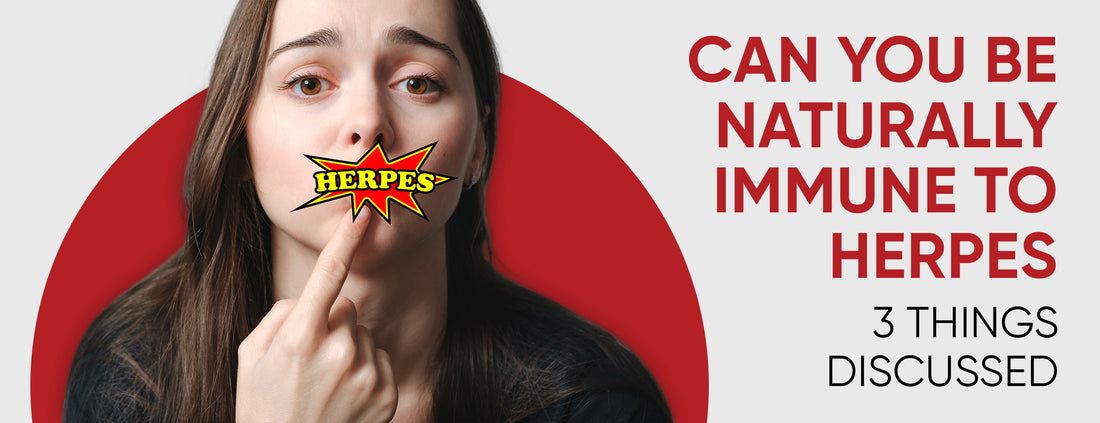It is caused by the herpes simplex virus, which can lead to painful blisters on the genital or oral area. The virus is highly contagious and can affect anyone, even those who practice safe sex.
Herpes enters the body through tiny breaks in the skin, often unnoticed. Once contracted, HSV-1 remains for life. No vaccine or natural immunity exists. The virus lies dormant in nerve cells and can reactivate periodically.
This post will explore whether it is possible to be naturally immune to herpes. We will dive into the different factors affecting natural immunity and the impact of medication on its effectiveness. Lastly, we will discuss natural cure and immune support for herpes and share a call to action with those curious about herpes status.
Can You Be Naturally Immune to Herpes: How It Can Protect?

Herpes is a viral infection that has been a concern for many individuals worldwide. While there is no guaranteed way to prevent it, some people have natural immunity to herpes. We will explore what innate immunity means, how it can protect against herpes, and the various factors that influence it.
Explanation of Natural Immunity
Natural immunity is the body's ability to defend itself against infections, including herpes, without needing vaccination or medication. It relies on the immune system's capacity to recognize and neutralize harmful pathogens. Here's how it works:
- Innate Immunity: The first line of defense involves physical barriers like the skin and mucous membranes preventing herpes from entering the body.
- Adaptive Immunity: If the virus breaches these barriers, the immune system kicks in. It produces antibodies and immune cells (T-cells) tailored to fight herpes.
- Memory Response: Once the immune system successfully combats herpes, it retains a memory of the virus. This memory response allows the body to react more swiftly and effectively if exposed to the virus again.
Extent of Natural Immunity to Herpes
Natural immunity to herpes can vary widely among individuals. While some people may never experience symptoms despite exposure to the virus, others may have recurrent outbreaks. Here are key points regarding the extent of natural immunity:
- Complete Immunity: Some fortunate individuals possess absolute immunity to herpes. They may carry the virus but never exhibit symptoms or transmit it to others.
- Partial Immunity: Others may have partial immunity, experiencing milder symptoms or fewer outbreaks than those without immunity.
- No Immunity: Unfortunately, many people have no natural immunity, making them susceptible to herpes infections.
Factors Affecting Natural Immunity
Several factors influence the level of natural immunity a person has against herpes. Understanding these factors can help individuals take proactive steps to protect themselves. Here are some crucial considerations:
- Genetics: Genetic factors play a role in determining susceptibility to herpes. Some individuals may inherit genes that confer natural resistance.
- Previous Exposure: Prior exposure to herpes, even without symptoms, can enhance natural immunity. The body's immune system becomes more adept at recognizing and fighting the virus with each encounter.
- Overall Health: A robust immune system is better equipped to combat herpes. Maintaining a healthy lifestyle through proper nutrition, exercise, and stress management can boost natural immunity.
- Age: Age can affect natural immunity. Younger individuals may experience more severe symptoms, while the elderly may have milder outbreaks due to their immune system's response.

Rare Nature of Natural Immunity to Herpes
Herpes is a widespread viral infection, but natural immunity to this virus is a relatively rare occurrence. We'll delve into the rarity of innate immunity to herpes, society's awareness of this phenomenon, and the ongoing research that seeks to unravel the mysteries surrounding it.
The Limited Cases of Natural Immunity to Herpes
Natural immunity to herpes is an intriguing but infrequent phenomenon. Here, we examine just how rare it is:
- Statistical Rarity: In the broader context of herpes infections, cases of natural immunity represent a tiny percentage of the affected population.
- Unpredictable Occurrence: Natural immunity to herpes does not follow a predictable pattern. It can occur in some individuals while others with similar risk factors remain susceptible.
- Viral Persistence: Herpes viruses are known for their ability to establish lifelong infections, making natural immunity even scarcer.
Society's Understanding of Natural Immunity
The awareness of natural immunity to herpes varies among individuals and within society. Here's a closer look at society's perceptions:
- Stigmatization: Society often stigmatizes herpes infections, leading to misconceptions and misunderstandings about natural immunity.
- Education Needed: There's a need for increased public education about natural immunity to herpes to reduce the stigma associated with herpes infections.
- Supportive Communities: Online communities and support groups are vital in educating and supporting individuals with herpes, including those with natural immunity.
Research on Natural Immunity
Scientific research plays a crucial role in unraveling the mysteries surrounding natural immunity to herpes:
- Ongoing Studies: Researchers continue investigating the mechanisms behind natural immunity, seeking insights into what makes some individuals naturally resistant to herpes.
- Genetic Factors: Studies suggest certain genetic factors may contribute to natural immunity. Researchers are working to identify these factors to develop better preventive measures.
- Vaccine Development: Understanding natural immunity can inform the development of vaccines and therapies to prevent and manage herpes infections.
Genital Herpes and Natural Immunity

Genital herpes is a prevalent sexually transmitted infection (STI) caused by the herpes simplex virus (HSV). While it can be a challenging condition to manage, some individuals exhibit natural immunity to genital herpes. In this section, we'll delve into the different types of herpes viruses, explore innate immunity in the context of genital herpes, and discuss the concept of resistance to this STI.
Immunity to Genital Herpes
Genital herpes can be challenging to manage due to its recurrent nature. Some individuals naturally exhibit immunity to this virus. Let's explore this further:
- Natural Immunity Overview: Natural immunity to genital herpes involves the body's ability to defend against the virus without prior exposure or medical intervention.
- Asymptomatic Carriers: Some people may carry the virus without ever experiencing symptoms. These asymptomatic carriers are less likely to transmit the infection to others.
- Reduced Severity: Individuals with natural immunity may experience milder or less frequent outbreaks if they contract the virus.
Resistance to Genital Herpes
Resistance to genital herpes can vary among individuals. Here are key points to consider regarding resistance to this STI:
- Partial Resistance: Some individuals may exhibit partial resistance, meaning they can contract the virus but have milder or less frequent outbreaks.
- Complete Resistance: Individuals may display total resistance to genital herpes. This means they can't contract the virus or transmit it to others.
- Immune System Role: Natural immunity and resistance to genital herpes are closely tied to the individual's immune system. A robust immune response can provide better protection against the virus.
- Potential Factors: Research is ongoing to understand the factors that contribute to resistance to genital herpes fully. Genetics and overall health are believed to play significant roles.
Valacyclovir on Natural Immunity: Impact
Valacyclovir is a medication commonly prescribed to manage herpes infections. In this section, we'll explore the role of Valacyclovir, how it affects the herpes virus, and its potential impact on natural immunity.

Overview of Valacyclovir
Valacyclovir is an antiviral medication used to treat herpes infections, including genital herpes, cold sores, and shingles. It is a prodrug of acyclovir, which is converted into acyclovir in the body, allowing for better absorption and effectiveness. Here's an overview:
- Proven Effectiveness: Valacyclovir is known for reducing the severity and duration of herpes outbreaks.
- Suppression Therapy: It is often prescribed as suppression therapy to prevent recurrent outbreaks.
- Safety Profile: Valacyclovir is generally well-tolerated, with few side effects, making it a common choice for managing herpes infections.
Effect on Herpes Virus
Valacyclovir primarily targets the herpes virus, inhibiting its replication and spread within the body. Here's how it affects the virus:
- Viral Replication: Valacyclovir interferes with the herpes virus's ability to replicate by inhibiting the action of an enzyme necessary for viral DNA synthesis.
- Symptom Reduction: Valacyclovir helps reduce the severity of symptoms during an outbreak by limiting viral replication.
- Transmission Prevention: It also lowers the risk of transmitting the virus to others, making it a valuable tool in preventing the spread of herpes.
Impact on Natural Immunity
While Valacyclovir effectively manages herpes outbreaks, it does not directly impact natural immunity. Here's how it relates to the body's inherent ability to defend against the virus:
- No Influence on Natural Immunity: Valacyclovir does not enhance or reduce natural immunity to herpes. It primarily targets the virus itself.
- Temporary Suppression: Valacyclovir's main role is suppressing herpes outbreaks during treatment. Natural immunity remains unchanged, but the virus is kept in check.
- Potential for Immune System Recovery: By reducing the frequency and severity of outbreaks, Valacyclovir may indirectly support the immune system, allowing it to recover more effectively.
Natural Cure and Immune Support for Herpes

When managing herpes, exploring natural remedies and immune support can be an appealing option. We will delve into various home remedies for herpes, the role of immune support in combating the virus, and the importance of considering natural cures.
Home Remedies for Herpes
Home remedies can offer some relief and support in managing herpes outbreaks. Here are some natural approaches that may help:
- Aloe vera: Applying aloe vera gel to herpes sores may help soothe discomfort and promote healing.
- Echinacea: Some individuals use echinacea as a herbal supplement to support the immune system's response to herpes.
- Lemon balm: Topical application of lemon balm ointment may reduce the duration of herpes lesions.
- Warm baths: Soaking in warm baths with added oatmeal or baking soda can alleviate itching and discomfort associated with herpes sores.
The Role of Immune Support
A robust immune system is crucial in managing herpes outbreaks and preventing recurrence. Here's how immune support can play a vital role:
- Healthy Lifestyle: Proper nutrition, regular exercise, adequate sleep, and stress management contribute to a robust immune system.
- Supplements: Some individuals take immune-boosting supplements like vitamin C, zinc, and echinacea to support their body's defense mechanisms.
- Stress Reduction: High stress levels can trigger herpes outbreaks. Stress-reduction techniques such as meditation, yoga, and deep breathing exercises can help.

Importance of Natural Cure
The concept of natural cures for herpes emphasizes a holistic approach to managing the virus. Here's why it's essential to consider natural remedies:
- Reduced Side Effects: Natural remedies often have fewer side effects than pharmaceutical ones, making them a gentler option for some individuals.
- Empowerment: Exploring natural cures empowers individuals to participate in their health and well-being actively.
- Complementary Approach: Natural remedies can complement conventional herpes treatments, supporting symptom management and immune system health.
Conclusion
While natural immunity to herpes is rare, it is still worth exploring the different factors affecting it to understand better this sexually transmitted disease. The limited cases of innate immunity to herpes have sparked interest in the medical community, and further research is needed to understand it fully.
For those living with herpes, it is recommended to seek medical treatment and support to manage symptoms and reduce the risk of transmission. We also encourage those curious about their herpes status to get tested and seek knowledge about their sexual health.
Natural cure and immune support can play a vital role in managing herpes symptoms, but it is crucial to always consult with a healthcare professional for proper treatment and advice. Remember, caring for one's sexual health is essential to overall well-being.










![Natural Ways to Boost Immunity [ Essential]](http://drnumb.com/cdn/shop/articles/How_to_Naturally_Boost_Immune_System__8_Tips_Essential.jpg?v=1706068514)



